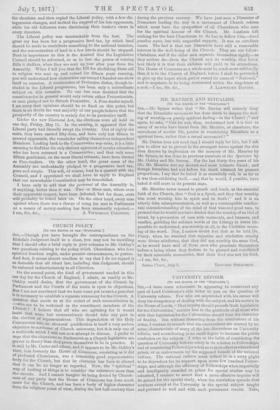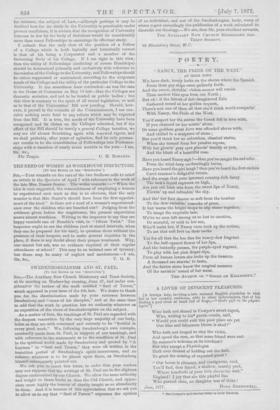UNIVERSITY REFORM.
[To THE EDITOR OF THE " SPROTATOR."}
have some reluctance in appearing to controvert any part of Lord Colchester's able letter to you on the question of University reform. FeW who are acquainted with his career will deny his competency of dealing with the subject, and his motion in the House of Lords, "That inquiry should precede fresh legislation for the Universities," entitles him to the gratitude of all those who wish that legislation. forthe Universities should bear the character of finality. But without dissenting from the conclusions of his letter, I venture to remark that his observations are marred by an error, characteristic of many of the late discussions on University reform, and contributing in no small degree to increase the public confusion on the subject. I refer to the habit of considering the question of University Reform solely in its relation to Fellowships, and of considering Fellowships solely as t o their effect as educational prizes, or as endowments for the supposed benefit of the national culture. The national culture must indeed be in a sorry plight to be dependent for its support upon some few hundred Fellow- ships, and although the efficiency of Fellowships when impartially and intelligently awarded as prizes for special studies may be admitted, I venture to assert that a more effective impulse will be gained for the special study, when the conviction spreads that nowhere except at the University is the special subject taught and pursued so well and with such permanent results. Take,
for instance, the subject of Law,—although perhaps it may be doubted how far its study in the University is practicable under present conditions, it is certain that the recognition of University honours in law by the body of Solicitors would do considerably more than many Fellowships to encourage its effectual study.
I submit that the only view of the position of a Fellow of a College which is both logically and historically correct is that of his being a Corporator and a member of the Governing Body of his College. if I am right in this view, then the utility of Fellowships (including of course Headships) should be determined primarily and exclusively with reference to the relation of the College to the University, and Fellowships should be either suppressed or maintained, according to the corporate needs of the College and the utility of the particular College to the University. It has sometimes been contended—as was the case in the House of Commons on May 18 last—that the Colleges are domestic societies, and not to be treated as public bodies ; but this view is contrary to the spirit of all recent legislation, as well as to that of the Universities' Bill now pending. Should, how- ever, it prevail in the councils of the• Commissioners, I can con- ceive nothing more fatal to any reform which may be expected from this Bill. It is true, the needs of the University have been recognised and its claims on the Colleges admitted, but if the effect of the Bill should be merely a general College taxation, we may see old abuses flourishing again with renewed vigour, and we shall probably, after years of agitation, find its only perman- ent results to be the consolidation of Fellowships into Professor- ships with a vacation of nearly seven months in the year.—I am, Sir, &c.,



































 Previous page
Previous page